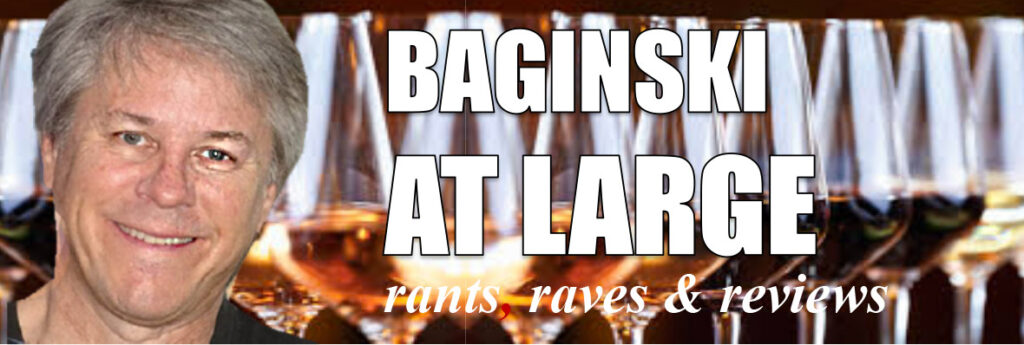Call me a wine yob, but I prefer a glass that is unencumbered by the sometimes ludicrously dissected descriptors of those over-the-top wine reviewers one occasionally comes across.
Let me say, I’m not entirely uncultured: I do not drink wine from a bag or a box and my choices have improved significantly from my first-ever sampling as a teen on a school band trip south of the border – Chateau Mallard (ok, it may have be Maillard, but the joke was not lost on us, perhaps because Baby Duck was inexplicably popular at the time…)
Over the years, I have visited and toured wonderful wineries around the world, from Australia to South Africa, and live within designated driving distance of Niagara wine country in southern Ontario (which I visited on occasion in those dreamy pre-pandemic days).
I have hitchhiked from Adelaide to the Barossa Valley to visit the famous Australian vineyards, and rode wine trains in Napa; picnicked with requisite bread, cheese and vin in Provence, and unexpectedly fell in love with a single, never-to-be-replaced bottle of gifted home-made “ghost wine” from a Tuscan estate that had a label emblazoned with a figure like a Charlie Brown Halloween costume.
Conversely, I’ve been offered vino from places that have no business being in the wine business and I even met my wife thanks to some putrid plonk served up on a Caribbean island where we should have known better (but fortunately didn’t).
And while I acknowledge that none of this makes me a wine sophisticate, it has, I believe, given me enough hard-won experience to suspect when someone has perhaps had a glass too many when venturing to knowingly narrate the qualities of a particular vintage.
For example, I understand that factors such as geography, fermentation and aging can suggest flavours in a wine that transcend the elemental grapes, ranging from various spices to all kinds of fruits, even butter and caramels.
However, I’m inclined to draw the line when snobby reviewers – like one I recently came across in a prominent newspaper – see fit to dubiously drill down to detect (and advocate) tastes of unlikely components in their sample – like tobacco leaf, “Black Forest” fruits (not just any old fruit…), pink peppercorn, toasted meringue, crushed sea salt, and even Danish pastry. Or more bafflingly: white flowers, brine, lavender, campfire, graphite, steel, and chalk.
I’m not sure why I would want my wine to taste like any kind of salt or a Danish pastry, or how anyone exactly knows what a campfire or graphite tastes like (short of chewing pencil ends, I guess), but I feel that if there is a hint of leather, wet or crushed stone, or “freshly turned” black earth said to be present, that the observation is being offered in a bad way, i.e. “This wine tastes like old shoes and dirt.”
I’m similarly disposed to feel oversold when I’m told that whatever flavours may be discerned are inclined to “flood” or “ripple” in, “unfurl,” “allude to,” “attack,” or, ominously, arrive with a “thunderclap.”
Alas, I have yet to be thunder-clapped by a wine – even by some of the swill I have swallowed.
At the same time, a loquacious commentator in question found select wines serving up uncomplicated, poised and fuss-free pleasures, which I didn’t take to mean having screw caps rather than corks.
Others exuded elegance, dignity, and great tension, which I would like to believe is simply code for over-priced and your spouse will kill you if you buy such an expensive bottle.
Another was a “beast,” which I admit is a term I have used to describe a wine or two, albeit the following morning.
Alas, when a reviewer suggested that one vintage was a “wine to ponder,” I pondered why I was still reading the article.
Those who know me know that when it comes to wine, I am generally inclined to declare that I either like something or I don’t, and it’s not too often the latter. Which is to say, I loathe wine snobbery, though, to be clear, never well-informed, well-meaning and largely adjective-free interest in a subject that, quite literally, is a matter of personal taste.
Other disciplines, such as food, art and music sometimes inspire similar musings (I once saw a song absurdly described as sounding like the “rusty underside of a ‘67 Chevy”) and, being a wordsmith, I acknowledge and appreciate the creative use of language. But personally, in such matters I prefer to keep it simple.
In fact, in practice I tend to prefer/defer to the straightforward wisdom of The Simpsons’ everyman bartender Moe Sizlack, who once declared, with simple elegance: “It’s like there’s a party in my mouth and everybody’s invited!”
Wine yob, indeed!
RELATED STORIES: I Hate Art


